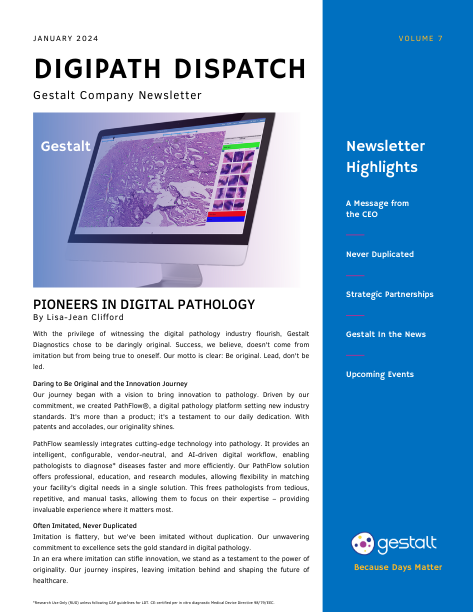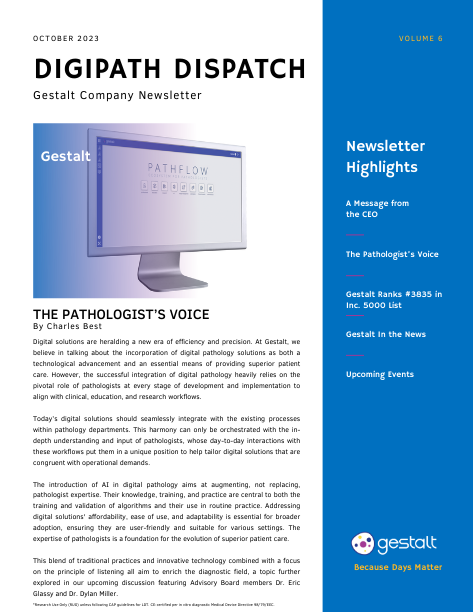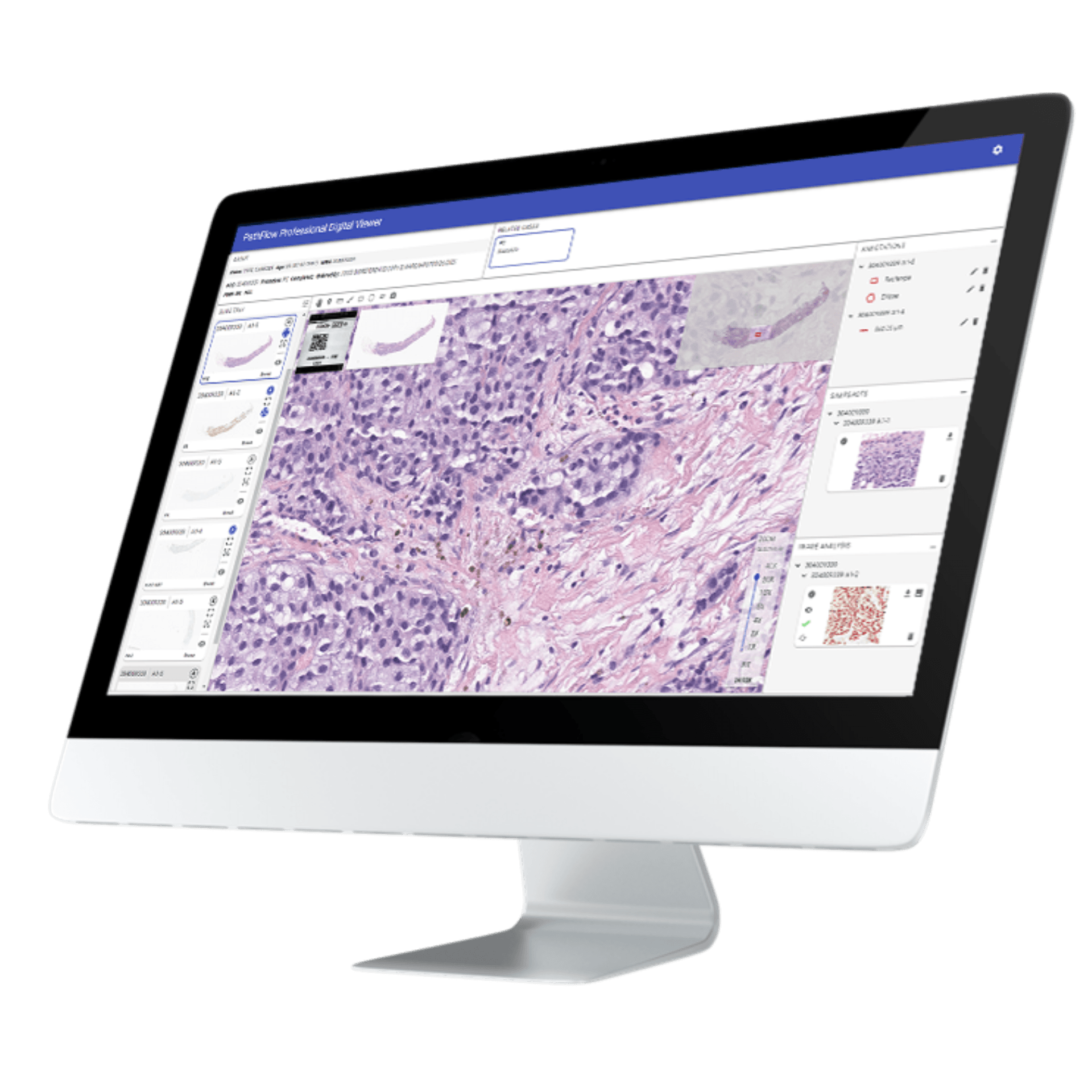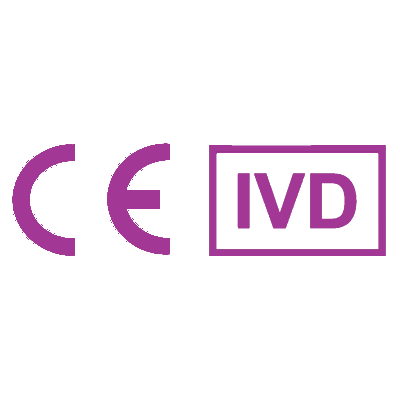IN RECENT NEWS
"One interesting observation is that the only company listed in all three functional categories is Gestalt Diagnostics. This must be a market-winning business strategy for Gestalt Diagnostics, as it is the only digital pathology company on the list above to grow rapidly enough to have made Inc. Magazine’s 2023 “5000 Fastest Growing Private Companies in America.” - The Dark Report, September, 2024
Pressroom
Pressroom
Gestalt in the Press &
Out in the Industry
Press Releases

By Lisa-Jean Clifford
•
16 Sep, 2024
September 16, 2024 – Spokane, Washington – Gestalt, a leader in AI-driven digital pathology solutions, is excited to announce its international expansion with the onboarding of its first client in Africa, DataPathology. This partnership marks a significant milestone as Gestalt continues to extend its global footprint, leveraging its innovative PathFlow digital solution with the new PathCloud platform to provide streamlined cloud-based digital access. DataPathology, a pioneering MedTech startup, operates five laboratories across Morocco and Djibouti. This collaboration aims to create a robust ecosystem that addresses two critical challenges in North Africa: the severe shortage of anatomic pathologists and the accessibility to specialized medical expertise. Addressing the Pathologist Shortage Africa faces a daunting shortage of pathologists, with an estimated ratio of 1 pathologist per 500,000 people. Given the continent’s population of approximately 1.2 billion, this translates to around 2,400 pathologists. In stark contrast, the United States boasts about 22,000 pathologists, resulting in a ratio of 1 pathologist per 15,000 people. This disparity underscores the urgent need for innovative solutions to bridge the gap in medical diagnostics and care. Enhancing Accessibility to Medical Expertise Through the integration of Gestalt’s PathCloud platform and the 3DHistech and Roches scanners, DataPathology will be able to connect its laboratories seamlessly, facilitating the rapid and accurate diagnosis of pathological samples. This technological advancement not only enhances the efficiency of diagnostic processes but also ensures that patients in remote and underserved regions have access to high-quality medical expertise. A Vision for the Future “We are excited to partner with DataPathology and bring our leading-edge technology to Africa,” said Lisa-Jean Clifford, COO & Chief Strategy Officer of Gestalt. “This collaboration is a testament to our commitment to improving healthcare accessibility and addressing critical shortages in medical expertise. Together, we aim to revolutionize the field of pathology and make a significant impact on patient care in North Africa.” DataPathology’s co-founder, Dr. Hicham El Attar, added, “Our partnership with Gestalt is a game-changer for pathology services in Morocco and Djibouti. By leveraging advanced digital pathology solutions, we can provide faster, more accurate diagnoses, ultimately improving patient outcomes and saving lives.” About DataPathology Founded in 2020, DataPathology is a MedTech startup specializing in pathology diagnostics. With a network of laboratories across Morocco and Djibouti, the company leverages artificial intelligence and digital technology to provide quick and accurate pathological diagnoses, addressing critical healthcare challenges in Africa. Gestalt Diagnostics, Inc. Gestalt Diagnostics transforms pathology through an intelligent, configurable, vendor-neutral, and AI-driven digital workflow that provides true interoperability enabling pathologists to diagnose diseases faster and more efficiently. Our PathFlow solution is a cloud-based digital pathology enterprise platform that can easily be customized based on your specific preferences. Our platform consists of professional, education, and research modules for ease of mixing and matching the digital needs of your facility in a single solution, freeing pathologists from tedious, repetitive, and manual tasks allowing them to focus on their expertise, providing invaluable expertise where it matters most. *Research use only unless following CAP guidelines for LDT. CE-IVD certified for use in Europe.
Publications

By Lisa-Jean Clifford
•
29 Aug, 2024
Featured in Medical Laboratory Observer - MLO Written By Lisa-Jean Clifford Incorporating digital pathology and AI solutions and workflows into your organization is an exciting opportunity to enhance your operational efficiency, positively impact your diagnostic accuracy, and increase the overall automation of your laboratory practice. It is essential for maintaining your competitive position in the industry with adoption of leading technology occurring at an ever-increasing rate. It is also important to understand your current technology infrastructure and workflows and to work closely with your digital pathology solution provider to ensure that you are taking full advantage of the benefits of deploying these technologies —both today and setting the foundation for further adoption of new technologies into the future. Things to consider 1. Understand your initial goals and your long-term goals. These two may be the same or very different, depending upon your adoption strategy and reasons. The most common goals for digital pathology solution adoption in the clinical setting today are: Reduce the need for transportation of glass between labs Access to geographically distributed facilities and pathologists The ability to recruit and retain pathologists Support the technical component (TC), professional component (PC), and global workflows for outreach clients Instant access to consultations for subspecialties and/or complex cases Tumor boards The ability to use artificial intelligence When considering the above, you may have one or more initial reasons or objectives in adoption with the understanding that you would like to achieve more of these goals, or additional ones, moving forward. 2. The implementation of digital pathology needs to be an organizational goal and not just one of the lab’s. The process starts with the technical side of the workflow — from the understanding of what the scanner(s) you choose to deploy require for ‘clean’ slides. This is something that can have a significant impact on the usability, speed, and value of digital. You must start with proper identification of your lab process for creating slides and know that things like misaligned slipcovers, smudges, fingerprints, substances on the glass, folds in tissue, bubbles, and other artifacts are going to cause scanned images (WSI’s) to be unusable. This will create inefficiencies and increased time by having to redo and rescan slides in order to get usable images to the pathologists. This is the first step in quality in, quality out.... Read More

By Lisa-Jean Clifford
•
26 Jun, 2024
Featured in Medical Laboratory Observer - MLO Written By Lisa-Jean Clifford Biomarkers serve as critical navigational tools, guiding physicians on their patients’ journey through the diagnosis, treatment, and management of their specific cancer. In oncology, a biomarker may be a molecule secreted by a tumor or a specific response of the of the body to the presence of cancer. It can help in identifying early-stage cancers, forecasting how aggressive a cancer might be, or predicting how well a patient will respond to treatment. Biomarkers are also used to predict or monitor cancer recurrence. Prostate cancer often begins its journey with the detection of prostate-specific antigen (PSA) in the blood. This biomarker, a protein produced by both normal and malignant prostate cells, can be elevated in the presence of prostate cancer. PSA testing has become a keystone in the early detection of prostate cancer, offering insight into the biological state of the prostate. If a person has been diagnosed with cancer, biomarker testing may show whether the cancer is more likely to grow and spread, if certain cancer treatments are likely (or unlikely) to be helpful, and whether the cancer treatment is working.1 Determining treatment: Predictive biomarkers Once prostate cancer is diagnosed, the next step involves predictive biomarkers, which help in predicting the cancer’s behavior and potential response to treatments. Genes like ER, PR, and HER2/neu, although more commonly associated with breast cancer, have parallels in prostate cancer research, where molecular markers can predict the effectiveness of therapies such as hormone treatments or chemotherapy. One of the biggest areas of research is in immunotherapy, this is a treatment that manipulates the patient’s immune system to fight cancer with drugs or modified immune T cells. In the past several years, immunotherapy has had great success in some patients with certain types of cancer, but not all patients respond to this type of treatment. I have written about this in previous articles I have done on cancer and treatments — I believe this type of treatment has great potential with further development.2 There is a significant amount of research focused on discovering biomarkers that could identify which patients are likely to respond to immunotherapy. In some types of cancer, the presence or absence of immune molecules in cancer cells has been associated with determining whether a patient will have a better or worse response to immunotherapy. Biomarkers can also be used to help physicians determine if there are clinical trials available for their patients. Some trials, called basket studies, are based on the biomarkers in tumors and/or cells instead of the primary body site of the cancer. There are other trials that are using biomarkers to match treatments based on the gene characteristics or genetic changes in the patient’s cancer. Monitoring treatment: Prognostic biomarkers ... Read More

By Lisa-Jean Clifford
•
03 Feb, 2024
Featured in G2 Intelligence January 2024—In an insightful discussion on the evolving landscape of data analytics within clinical laboratories, Lisa-Jean Clifford, COO and Chief Strategy Officer at Gestalt Diagnostics, highlights the integration of data analytics across various facets of laboratory operations. She emphasizes its critical role in enhancing operational efficiency, resource management, and patient safety. Clifford's commentary sheds light on the extensive applications of data analytics in lab environments—from streamlining operational workflows to improving patient care. She also addresses the challenges labs face, such as navigating the vast array of data analytics solutions and the need for specialized knowledge in pathology informatics. Moreover, Clifford points to the promising future of digital solutions and AI in expanding the capabilities of clinical labs, suggesting a burgeoning potential for growth and innovation in the field.
Blog
DIGIPATH Dispatch Quarterly Newsletter
Frequently Asked Questions
Useful links
Newsletter sign up
Newsletter sign up
Thank you for joining the Gestalt Community.
Oops, there was an error sending your message.
Please try again later.







